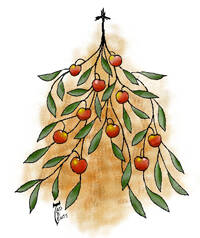Peace in the Church
In 2001 Cardinal Walter Kasper and Cardinal Joseph Ratzinger conducted a friendly theological debate in this magazine on the nature of the church (4/23/01, 11/19/01). Cardinal Ratzinger argued for the priority of the universal church over the local church, even from its beginning. Cardinal Kasper challenged this as akin to a Platonic ideal, as if the church existed in some spiritual sphere only to be instantiated in the physical world by concrete communities. Cardinal Kasper argued that local churches provide the very basis for the universal church’s existence. This debate was not merely about the early church but involved the question of where ecclesiastical power comes from and how it should be exercised.
The weight of scriptural evidence leans heavily toward Cardinal Kasper’s position, at least in terms of word usage. Luke, who wrote the Acts of the Apostles, employs the term church 19 times, and in 18 instances he means the local community. The one exception is in today’s first reading from Acts: “The church throughout all Judea, Galilee and Samaria was at peace.”
When I look at the state of the universal church today, I do not see this enviable peace. Nor do I see it in the local church. In fact, my university church is a bit of a magnet for the disgruntled intelligentsia of the diocese. How can we return to the early church’s deep sense of peace? In truth, we cannot, because in many respects it never existed. One needs only to read St. Paul to see that not all was well with either local churches or the universal church. Paul publicly denounced Peter as a hypocrite in Antioch (Gal 2:11-14); he cursed any Christian who disagreed with him on the essence of the Gospel (Gal 1:8); he dressed down the Corinthians, who were in disarray (1 Cor 11:17-12:31); he recognized that some fellow preachers had really bad motives (Phil 1:15); he literally begged the Philippians to be of one mind and heart (Phil 2:1-5); and finally, he reminded his detractors that he was “not at all inferior to these super-apostles” (2 Cor 12:11). This is starting to sound like the church I know.
Luke is giving us an ideal church rather than the messy one that existed, but that does not mean he is falsifying things. Rather, Luke is pointing toward an ideal. He tells us that it is possible to know deep peace even while enduring persecution from the outside and challenges from within. It is interesting that this very passage in Acts describes Paul’s meeting with the pillars of Jerusalem, who represented leadership in both the local and universal church (Acts 15). Having experienced his persecution of the church, they were wary. Barnabas assured them that Paul was one of them now. He vouched for Paul, and we learn that soon Paul “moved about freely with them.” More literally, Acts says that “he went in and out with them,” which suggests companionship.
Such intimacy among us ultimately has to be rooted in Christ. In today’s Gospel reading Jesus tells us that he is the vine and his true disciples are the branches. He reminds us that without him we wither and die, but with him and through him we flourish and produce great fruit.
If we want the church to be at peace, we should gracefully (and even gratefully) accept that it includes leaders in their legitimate role and firebrands who are allowed to be firebrands. We need solicitous faithful as well as superiors willing to be stretched and challenged. And we need Barnabas-types, faithful guarantors who know how to bring them together skillfully. Above all, we need to recognize that we all live through Christ our life.
The Second Vatican Council taught us that we are a church of churches. Our uniqueness and plurality contribute to a complete expression of life in the Spirit. In both its immediacy and universality, the church should strive to be at peace.
This article also appeared in print, under the headline “Peace in the Church,” in the April 30, 2012, issue.








